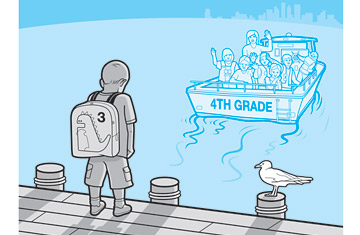
If you want kids to succeed in school, look no further than the third grade. So says a body of research showing that if kids haven't mastered reading by then, their ability to keep up in other subjects starts to decline. That has led 32 states to adopt policies specifically targeting third-grade reading skills. In 2012, 13 states have passed laws that aim to identify struggling readers and intervene before they reach fourth grade; 14 have gone so far as to require schools to hold back third-graders who don't score high enough on the state reading test. Legislators advocating intervention have seized on studies like the one published last year by Donald Hernandez, a sociology professor at the City University of New York, that analyzed the reading scores and graduation rates of nearly 4,000 students born from 1979 to 1989 and found that 1 in 6 who couldn't read at grade level by third grade didn't finish high school by age 19--four times the rate of proficient readers. Better to keep them back when they're young, advocates argue, to help them catch up.
But doing so is a pricey proposition: the U.S. already spends an estimated $12 billion a year on K-12 students who are repeating a grade. And the new laws requiring thousands of kids to sit through third grade a second time go against a half-century of education policy. Schools have long argued that "social promotion"--pushing students on the bubble up to the next grade--is better than subjecting them to bullying from their peers and other potentially detrimental effects that often coincide with repeating a grade. Numerous studies have shown that students who are held back have less confidence and less attachment to school, which makes them more likely to drop out.
It's hard to know whether academic deficits are the cause of kids' social problems or the result of them. In August the Brookings Institution shed new light on this debate when it released a report that attempts to isolate the impact of a child's being held back from other factors, including poverty and parental involvement. The study's author, Professor Martin West of Harvard's Graduate School of Education, looked at the outcomes of thousands of students in Florida, which since 2003 has been holding back third-graders who fail the state reading test and providing them with extensive remediation. (In the policy's first year, 21,799 students had to repeat third grade, up from 4,819 the previous year.) West studied two very similar groups of kids--one group scored exactly at the cutoff on Florida's third-grade reading test, and the other scored just one point above--and found that by the time they were in eighth grade, students who repeated third grade scored higher on reading and math tests than their peers who had been promoted to fourth grade without a hitch.
